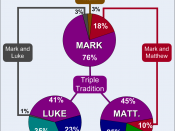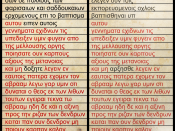The teachings of Jesus are central to the New Testament and to Christianity. Much of what is known about the life and teachings of Jesus is written in the Bible's four Gospel books-Matthew, Mark, John, and Luke. Each of the Gospels is considered anonymous in the sense that none include the actual author's name. Three of the Gospels are remarkably similar and are often considered together and read side by side as the "Synoptic Gospels." The Synoptic Gospels include the Gospels of Matthew, Mark, and Luke. These three Gospels are similar in the way that they describe the life of Jesus as traveling around and preaching the Christian viewpoint in parables, while John presents a different, spiritual view of Jesus. Another factor which makes the Synoptic Gospels alike is that the teachings of Jesus exist as parables in these three Gospels. Jesus explains his reasoning for the use of parables in Mark 4:10-12 :
When he was alone, those who were around him along with the twelve asked him about the parables.
And he said to them, "To you has been given the secret of the kingdom of
God, but for those outside, everything comes in parables; in order that 'they may indeed
look, but not perceive, and may indeed listen, but not understand; so that they may not
turn again and be forgiven.'" (Ehrman 44)
Therefore, only those who have a pure heart and who are true believers would understand the meaning behind his baffling analogies and its connection to life, such as in the notoriously difficult teaching labeled The Parable of the Dishonest Steward.
The form and function of the literary form "parable" is very important in deciphering certain texts in the bible. Literally the term parable means to "throw alongside to make familiar or to...



Misses the Point
The essay misses the correct interpretation of the parable, which is found in v16:8b-13, verses not addressed in this essay. The idea should run along the lines that we are God's stewards with his resources (money, time, etc) and we are expected to put them to use for the kingdom of God. People of the world are more shrewd in handling resources - they know how to make it count. Verses 16:10 and 11 sums it up. Be carful using this assignment.
0 out of 0 people found this comment useful.